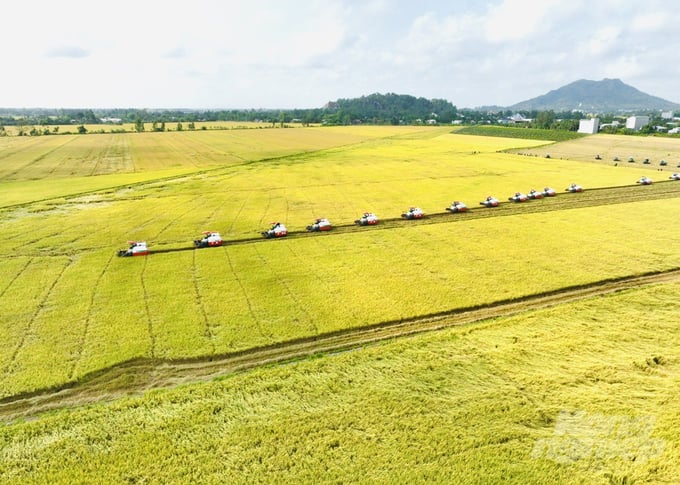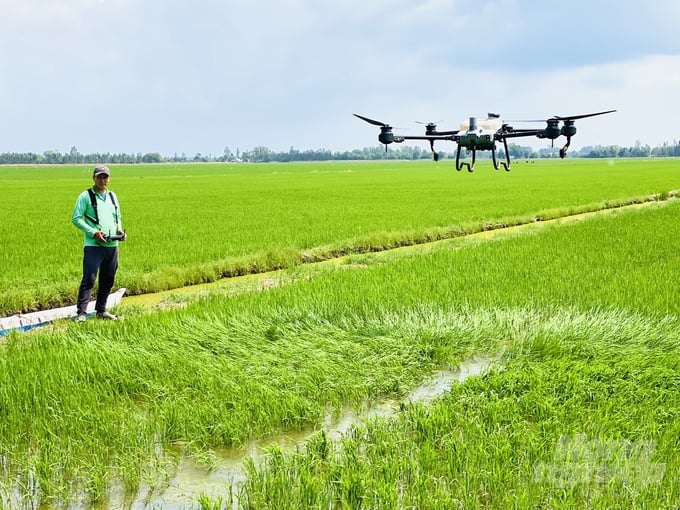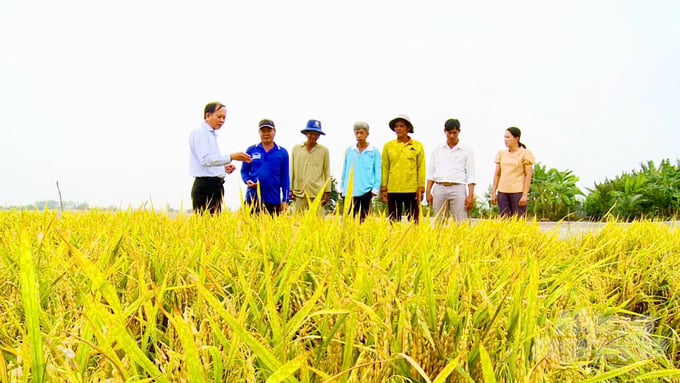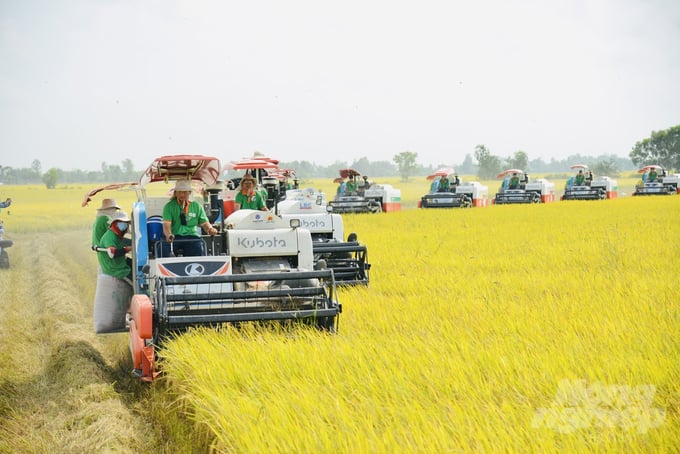June 20, 2025 | 17:02 GMT +7
June 20, 2025 | 17:02 GMT +7
Hotline: 0913.378.918
June 20, 2025 | 17:02 GMT +7
Hotline: 0913.378.918

In 2024, An Giang will deploy 21,000 hectares of rice according to the process of the 1 million hectares of high-quality rice project with dozens of models, each model 50 hectares. Photo: Le Hoang Vu.
The People's Committee of An Giang Province conducted a review conference on December 17 to evaluate the first year of the "Sustainable Development of One Million Hectares of High-Quality and Low-Emission Specialized Rice Associated with Green Growth in the Mekong Delta" project, which strives to achieve 2030.
Mr. Ho Van Mung, Chairman of the An Giang Provincial People's Committee, observed that An Giang has the second-largest rice production area in the Mekong Delta, with an annual output of 4 to 4.1 million tons. This area makes a substantial contribution to national food security and exports.
An Giang devised a strategy to achieve 150,000 hectares by 2030 while participating in the project. After one year of implementation, the project has yielded initial positive results due to the extensive efforts to enlighten and engage the public about its objectives and direction.
The 2023 autumn-winter season saw the successful testing of production models that adhered to the Department of Crop Production's guidelines, thereby showing the viability of further expanding sustainable, high-quality production. An Giang intends to establish a safe, low-emission rice brand by strengthening value chain production, attracting business participation, and enhancing the capacity of cooperatives. The Provincial People's Committee has instructed departments, sectors, and localities to continue to make proactive, innovative efforts to achieve the project's objectives.
The Deputy Director of the Department of Agriculture and Rural Development of An Giang, Mr. Tran Thanh Hiep, reported that the project yielded substantial results after one year, including an increase in rice farmers' profits and a reduction in emissions. This advancement establishes the groundwork for the project's future growth in the years ahead.

Currently, An Giang has over 300,000 farmers directly producing rice and 229 agricultural cooperatives playing an important role in participating in the 1 million hectare high-quality rice project. Photo: Le Hoang Vu.
An Giang will implement 21,000 hectares of rice production in 2024 in accordance with the project's standards. This will be achieved through the use of dozens of models, each of which will cover 50 hectares, resulting in a total of 900 hectares across nine districts, towns, and cities. Furthermore, four models that rigorously adhere to the Ministry of Agriculture and Rural Development's criteria will cover 52 hectares in four districts: Phu Tan, Chau Thanh, Tri Ton, and Thoai Son. The autumn-winter season saw the implementation of a high-quality, low-emission rice production process on 165 hectares in the Phu Tan and Chau Phu districts.
In addition to these models, An Giang has conducted 93 training sessions on the project's implementation criteria and 12 technical training sessions that are in accordance with the Ministry's standards.
The demonstration models' results suggest a 67 kilograms per hectare decrease in seed consumption (control: 120-170kg/ha; model: 80kg/ha). In terms of produce, the demonstration fields averaged 0.1 tons/ha more than the control (6.5 tons/ha for the model and 6.4 tons/ha for the control; model/control). Profits exceeded the control by 3.6 to 5.3 million VND per hectare, and production costs were reduced by an average of 4 to 5 million VND per hectare.
The project's demonstration models serve as benchmarks for producers to observe, learn, and replicate, thereby establishing the foundation for broader adoption. The initial positive results have incited a gradual shift in farming practices and attitudes toward sustainable production and compliance with technical standards.

The 1 million hectare high-quality rice project in the Mekong Delta is bringing good results for rice growers. Photo: Le Hoang Vu.
The province has recorded 7,419 hectares of virtually compliant areas out of 20,690 hectares (developed under the VnSAT project by the end of 2023), in addition to the 1,117 hectares that fully meet the technical requirements of the project's processes. 36% of the area met the straw collection targets. The demonstration models of the project have implemented mechanization in more than 70% of the production phases.
An Giang is home to more than 300,000 rice producers and 229 agricultural cooperatives that are essential to the One Million Hectares of High-Quality Rice Project.
Under the initiative, Mr. Tran Van Lo Ba, Chairman and Director of Phu Thanh Agricultural Cooperative (An Giang), underscored the critical role of cooperatives and collaborative groups in organizing production, providing agricultural input materials, and linking rice consumption. The model that connects households, cooperatives, and businesses has provided practical benefits, such as stabilizing market access for farmers, creating large raw material areas, reducing production costs, and increasing income through advanced techniques and mechanization, as he noted.

Minister of Agriculture and Rural Development Le Minh Hoan encouraged An Giang to promote the application of precision agriculture in rice production. Photo: Le Hoang Vu.
To contribute to the establishment of a sustainable value chain, Phu Thanh Cooperative has formed a partnership with Loc Troi Group and other enterprises to produce EU-standard rice. Nevertheless, obstacles persist, including climate change, fragmented production areas, limited diversification of consumption partners, and unequal awareness of cooperatives' responsibilities. Mr. Lo Ba suggested a variety of solutions to the challenge of constructing a modern, sustainable agriculture sector, such as the planning of value chain production, advancing the development of a circular economy, improving the quality of dissemination, and enhancing of linkage mechanisms.
Minister of Agriculture and Rural Development Le Minh Hoan characterized the One Million Hectares of High-Quality Rice Project as a transformative initiative that would enhance Vietnam's rice sector and increase global recognition of Vietnam's low-emission rice brand.
The Minister emphasized the objective of reorganizing the rice sector in order to achieve sustainability, adapt to climate change, and align with global green consumption trends. The reduction of production costs, the enhancement of rice quality and value, and the protection of the environment and the health of producers are all critical components of sustainable agricultural development.
The Minister encouraged government authorities, enterprises, and cooperatives to provide assistance to producers. Businesses should commit to procuring rice at prices that exceed market rates in order to promote cooperative participation, collaboration, and profitability. The promotion of precise and efficient cultivation techniques and the enhancement of farmers' capacities through agricultural extension activities are essential for the attainment of sustainability.
It is imperative to prioritize Model 1 of the One Million Hectares of High-Quality Rice Project, which is associated with verdant growth. The Minister urged An Giang to enhance precision agriculture, reduce the density of seed sowing, reduce the use of fertilizers, pesticides, and emissions, and preserve the quality and value of rice. In addition to reducing production costs, these endeavors also safeguard the environment, enhance soil health, and promote biodiversity.
The Minister emphasized the necessity of a connected ecosystem that includes the government, businesses, and producers in the process of restructuring the rice sector. While guaranteeing consistent market access, enterprises should to allocate capital toward contemporary infrastructure and equipment. In order to cultivate trust and attachment among farmers to the production chain, authorities must provide timely support to resolve difficulties.
Translated by Linh Linh
![Turning wind and rain into action: [9] Digitizing hydrometeorological data in response to climate change](https://t.ex-cdn.com/nongnghiepmoitruong.vn/608w/files/news/2025/06/17/z6704423696987_15fd32ffc26d590d204d520c9dac6786-nongnghiep-165943.jpg)
(VAN) Farmers have begun accessing hydrometeorological applications to adjust their cropping schedules, aiming to ensure productivity and adapt to climate change.
![Turning wind and rain into action: [8] Real-time salinity detection and early warning technology](https://t.ex-cdn.com/nongnghiepmoitruong.vn/608w/files/news/2025/06/17/z6704423696987_15fd32ffc26d590d204d520c9dac6786-nongnghiep-151127.jpg)
(VAN) Thanks to the integration of modern hydrological-hydraulic models, remote sensing technologies, and artificial intelligence, the accuracy of hydrological forecasting has significantly improved.
![Turning wind and rain into action: [7] Early disaster warnings help marine farmers minimize losses](https://t.ex-cdn.com/nongnghiepmoitruong.vn/608w/files/news/2025/06/17/z6704423696987_15fd32ffc26d590d204d520c9dac6786-nongnghiep-142942.jpg)
(VAN) In recent years, thanks to early disaster warnings and forecasting, marine farmers in Khanh Hoa province have been able to reduce risks and losses, thereby improving production efficiency.
![Turning wind and rain into action: [6] ‘Four on-the-spot’ disaster management software](https://t.ex-cdn.com/nongnghiepmoitruong.vn/608w/files/news/2025/06/17/e5a48259d6a262fc3bb3-nongnghiep-183800.jpg)
(VAN) By simply activating the scenario on the disaster management software, the relevant authorities immediately know how many households need to be evacuated, where to evacuate them to, and by what means of transportation…
![Turning wind and rain into action: [5] Hue applies modern technology in disaster forecasting](https://t.ex-cdn.com/nongnghiepmoitruong.vn/608w/files/news/2025/06/17/z6704423696987_15fd32ffc26d590d204d520c9dac6786-nongnghiep-093938.jpg)
(VAN) In Hue city, modern technology has recently been applied in meteorological and hydrological forecasting and warning, helping to reduce the damage caused by natural disasters.

(VAN) A cutting-edge farming technique being implemented on an experimental ranch in Arizona's Sonoran Desert has already saved a billion gallons of water over five years, according to Civil Eats.

(VAN) Poultry and pig production and the environment can be boosted through enhanced water technology, according to new research.